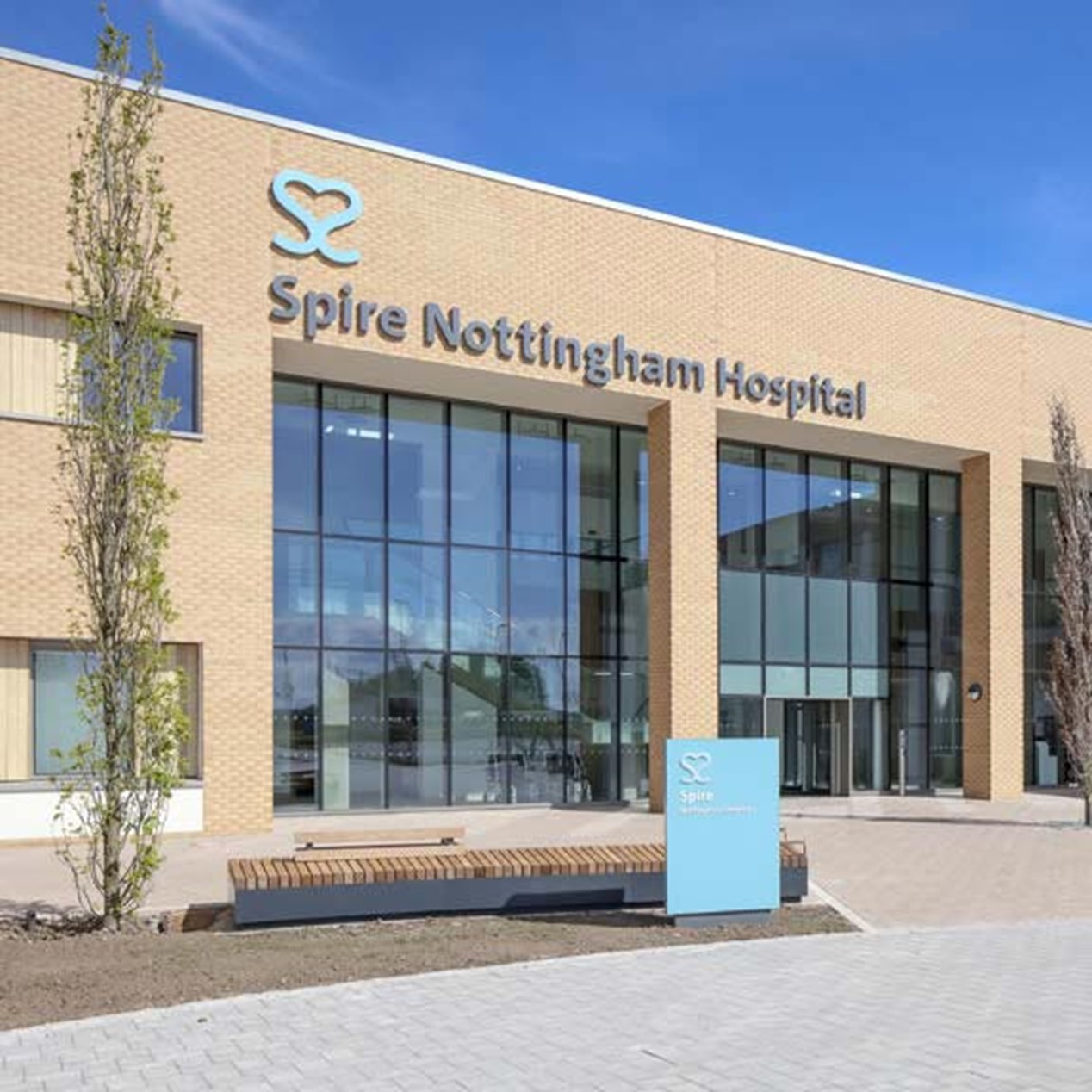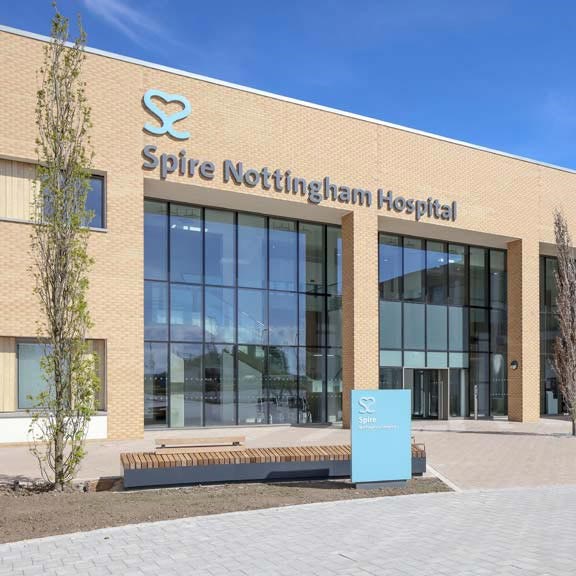Hernia surgery
Repairs the weak spot in the abdominal wall that caused the hernia.
We offer the latest surgical techniques to repair an inguinal hernia – a swelling or lump in your groin caused by a weakness in your abdominal wall muscles.
Sometimes also called
- Herniotomy
- Hernioplasty
- Herniorrhaphy
At a glance
-
Typical hospital stay
Same-day discharge or 1 night -
Procedure duration
Under an hour -
Type of anaesthetic
General, spinal or local -
Available to self-pay?
Yes -
Covered by health insurance?
Yes
Why Spire?
- Fast access to a wide range of treatments
- Consultants who are experts in their field
- Clear, inclusive pricing
- 98% of our patients are likely to recommend us to their family and friends
A hernia is a small lump that occurs when some of the contents of the abdomen (such as part of the intestine) push through a weakness in the abdominal wall. They can occur in anyone, however commonly result from a strain in the stomach area, when pressure is raised through activities including persistent coughing, lifting heavy objects or straining on the toilet. An inguinal hernia is the most common type of hernia.
They can be repaired through an operation lasting around an hour which is usually done as a day case.
Why you might need it
Although a few people may be born with hernias, they are far more likely to develop in later life. A hernia is a small lump that occurs when some of the contents of the abdomen push through a weakness in the abdominal wall, leaving a visible protrusion at times.
They are not usually serious but yours might have been causing you pain and discomfort that only surgery will fix (source: British Hernia Society). Your consultant is also likely to recommend surgery if your symptoms are severe or getting worse, or if the hernia is affecting your ability to carry out your normal activities.
Most hernias will generally become bigger and more uncomfortable over time (source: British Hernia Society).
Our highly qualified consultant will understand these issues and will help you reach a decision that is right for you.
Sometimes if the hernia contains a part of your bowel, muscle or other tissue, there is a small risk of strangulation or obstruction. You should seek urgent medical attention if you have severe pain in the affected area as a strangulated hernia will require emergency surgery (source: NHS Choices).
A routine hernia operation is likely to take around an hour and you will have either a general or local anaesthetic. Both keyhole and open surgical techniques are used, depending on your particular circumstances and the type and severity of your hernia.
Most hernias are treated as day cases; it is likely that you will be able to go home on the day of the operation or the next day.
If you decide to have your treatment with us, you will be looked after by an experienced multi-disciplinary care team.
Find a Spire hospital offering this treatment

Who will do it?
Our patients are at the heart of what we do and we want you to be in control of your care. To us, that means you can choose the consultant you want to see, and when you want. They'll be with you every step of the way.
All of our consultants are of the highest calibre and benefit from working in our modern, well-equipped hospitals.
Our consultants have high standards to meet, often holding specialist NHS posts and delivering expertise in complex sub-specialty surgeries. Many of our consultants have international reputations for their research in their specialised field.
Before your treatment
You will have a formal consultation with a healthcare professional. During this time you will be able to explain your medical history, symptoms and raise any concerns that you might have.
We will also discuss with you whether any further diagnostic tests, such as scans or blood tests, are needed. Any additional costs will be discussed before further tests are carried out.
Preparing for your treatment
We've tried to make your experience with us as easy and relaxed as possible.
For more information on visiting hours, our food, what to pack if you're staying with us, parking and all those other important practicalities, please visit our patient information pages.
Our dedicated team will also give you tailored advice to follow in the run up to your visit.
The procedure
We understand that undergoing surgery might cause you anxiety and worry - even if having a hernia repaired is a relatively common and straightforward procedure. Our experienced and caring clinical staff will be there with you every step of the way. As well as delivering excellent care and treatment, they’ll answer your questions and provide reassurance if you are worried at any stage.
Whether you have a general or a local anaesthetic will depend on the type and severity of your hernia, the particular type of surgery used to repair your hernia and your individual circumstances (such as other medical conditions). Your consultant will discuss this with you before surgery.
Generally, the procedure will take less than an hour.
There are two ways a hernia can be treated:
Laparoscopic (keyhole) inguinal hernia repair
Your surgeon will make two or three small cuts to your abdomen, through which a tube like camera will be passed to enable your surgeon to view the hernia. Special surgical instruments are then used to repair the hernia and a synthetic mesh may be used to strengthen the abdominal wall. This is less invasive than older methods.
Open inguinal hernia repair
A single incision of around 5-10cm is made and the bulge is pushed back into place. A mesh may be used to support the area. The skin is then closed using dissolvable stitches.
The procedures used during your operation will depend on the type of hernia you have.
Aftercare
After this, you will be taken to your room or comfortable area where you can rest and recuperate until we feel you’re ready to go home.
Repairing a hernia is routinely performed as a day-case procedure, without an overnight stay in hospital.
According to the British Hernia Society, most of those people who stay overnight after a hernia operation do so because they would be alone at home or they have other complicating medical conditions. You might also stay in overnight if you find it difficult to pass urine after surgery. Most people make a full recovery within a few weeks (source: NHS Choices).
Pain relief
We will provide you with a supply of all the medicines your consultant feels you need to take home with you after you've left hospital, up to 14 days. This may be at an additional cost to some patients.
Recovery time
When we discharge you we'll talk to you about whether your stitches need to be removed and your dressing and make an appointment to see your consultant again.
If you have dissolvable stitches these will disappear after about seven to ten days. If you have non-dissolvable stitches, your nurse will make an appointment for you to have them removed in the out-patient clinic.
You will probably be able to return to your job within a week or two, although you should not do any heavy lifting at home or work for at least six weeks. We'll talk about this with you.
How your loved ones can help
Once you’re ready to be discharged, you’ll need to arrange a taxi, friend or relative to take you home as you won’t be able to drive. You should also ask them if they can run some light errands such as shopping for you as you won’t be feeling up to it.
After you leave hospital
Even once you’ve left hospital, we’re still here for you. Your consultant is likely to want to see you after your operation, a follow up appointment will be made before you leave.
On rare occasions, complications following hernia surgery can occur. The chance of complications depends on the exact type of operation you are having and other factors such as your general health. We will talk to you about the possible risks and complications of having this procedure and how they apply to you.
If you have any questions or concerns, we’re ready to help.
Why choose Spire?
We are committed to delivering excellent individual care and customer service across our network of hospitals, clinics and specialist care centres around the UK. Our dedicated and highly trained team aim to achieve consistently excellent results. For us it's more than just treating patients, it's about looking after people.
Important to note
The treatment described on this page may be adapted to meet your individual needs, so it's important to follow your healthcare professional's advice and raise any questions that you may have with them.
What is hernia surgery?
An inguinal hernia repair is an operation your doctor may suggest if you have a swelling or lump in your groin (or an enlarged scrotum in men), due to a hernia that’s causing pain or other problems.
An inguinal hernia occurs when part of your intestine, or the fatty tissue around it, pokes through a weak spot in your abdominal wall muscles. It is more common in men. Most are thought to result from ageing as your abdominal wall becomes weaker with age, though it can be present from birth. Inguinal hernias can also develop suddenly after putting pressure on the abdominal muscles, such as straining as a result of constipation, and they have also been linked to a persistent, heavy cough. You may find that the pain is often worse when you cough or stand and may disappear completely when you lie down.
Inguinal hernias are the most common type of hernias, but others include:
- Femoral hernia – a lump around the top of your thigh as part of your bowel or the fatty tissue around has pushed through your groin
- Hiatus hernia – where part of your stomach has moved through a hole in your diaphragm known as the hiatus and into your chest
- Umbilical hernia – a painless lump in or around your belly button as part of your bowel has pushed through the abdominal wall where the umbilical cord once was. This is common in infants though it can occur in adulthood
An inguinal hernia doesn't tend to improve if it's left untreated, so surgery is recommended. The operation involves pushing the protruding tissue back into place and repairing the weakness in your abdominal wall, usually with mesh.
Your consultant may recommend surgery if your hernia is:
- Painful
- Interfering with daily activities such as bending or lifting
- Growing
- Making complications more likely – if a portion of the protruding tissue becomes stuck in your inguinal canal, it can cause vomiting, stomach discomfort and a painful lump in your groin (obstructive hernia). If the protruding tissue becomes trapped in your abdominal wall, the blood supply may be cut off, which is potentially life-threatening (a strangulated hernia)
Your consultant can usually diagnose a hernia by examining the lump and asking you to stand, cough and lie down.
Sometimes they may send you for these tests to confirm the diagnosis:
Find your nearest Spire hospital
Almost all of our hospitals offer private hernia repair. We have dedicated general surgeons who specialise in this procedure and use many of the latest techniques and innovations.

Events
Free Mini Vascular Monthly Consultations with Mr Oluwole
Free mini consultation with Consultant Vascular and Endovascular Surgeon, Mr Akin Oluwole
Learn more
Heart to heart free patient event – Cholesterol and cardiac risk explained
Join us for a free information and Q&A session with our Consultant Interventional Cardiologist, Dr Julian Strange
Learn more
Nature therapy for children with Dr Chinwe Ude
Dr Chinwe Ude, invites you to an online seminar exploring the transformative impact of nature therapy on children with neurodiversity.
Learn more
How hernia repair surgery works
You can either have traditional open surgery or laparoscopic (keyhole) surgery.
With open surgery, your surgeon will:
- Make one incision (cut) over your hernia
- Push the protruding tissue back into your abdomen
- Staple or glue mesh on to the weak part of your abdominal wall
- Close your wound with stitches
With keyhole surgery, your surgeon will:
- Make small incisions (cuts) in your abdomen – usually three incisions
- Insert gas into your abdomen so they can see your organs more clearly
- Insert the laparoscope, a thin tube with a light and tiny camera, which sends images from inside your abdomen to a video screen
- Insert tiny surgical instruments through your other incisions to move the protruding tissue back inside your abdomen
- Repair the weak part of your abdominal wall with mesh, using either the transabdominal preperitoneal (TAPP) technique or the newer totally extraperitoneal (TEP) technique
- Release the gas from your abdomen
- Close your incisions with stitches
TAPP and TEP: what’s the difference?
- TAPP – your surgeon will insert the instruments through your abdomen muscle wall and lining, known as the peritoneum, to attach the mesh to strengthen the weakened section
- TEP – your surgeon will repair your hernia from outside your abdomen lining and all incisions in your skin will be sealed after
Your surgeon will explain the pros and cons of each method and which is best for you. This will depend on:
- Your overall health – if you’re elderly or of ill-health, you may be less likely to tolerate general anaesthetic safely, it may be recommended that you receive open surgery under local anaesthetic
- The type of hernia you have – particular techniques are better at treating different types of hernia, for example, keyhole surgery is better for treating bilateral hernias (occurring on both sides)
- Whether you’ve had a hernia before – if your hernia is recurrent, keyhole surgery is likely to be the best technique to repair your condition
- Your surgeon’s preference – open surgery is a more common method and some surgeons won’t have enough experience to treat using keyhole surgery
If surgery is not for you, your doctor may recommend wearing a hernia truss or corset as an alternative. This undergarment keeps the inguinal hernia in place and will relieve your discomfort, though it should only be used temporarily and it won’t treat your lump.
What to expect during hernia repair surgery
Who will be involved?
As well as your chosen surgeon, you’ll also be seen by an anaesthetist who’ll administer anaesthetic during the operation.
How long does an inguinal hernia repair take?
The surgery will usually last around one hour. You’ll need to allow 30 minutes before for the anaesthetic to take effect and another 30 minutes after the procedure for these effects to wear off.
How to prepare for an inguinal hernia repair
Before your surgery, you’ll be sent some instructions about when to stop eating and drinking in preparation for your operation.
Anaesthetic choices
Your consultant will advise on what’s best, based on your health, the surgical method and where your hernia is. It will either be:
- A general anaesthetic, when you’re asleep
- A spinal or epidural anaesthetic, when you’re awake but can’t feel anything below your waist
- A local anaesthetic, when you’re awake but you can’t feel anything in your abdomen
You’ll usually need a general anaesthetic for laparoscopic hernia repair.
If you have the spinal or local options, you may be offered a sedative.
Pain after an inguinal hernia repair
There tends to be less pain with keyhole surgery than with open surgery but you’re still likely to feel some soreness and discomfort once your anaesthetic wears off. Everyone experiences pain differently, but don’t worry, you’ll be given painkillers to help you manage this afterwards.
Your hospital stay
You’ll usually go home on the same day or the following day.
Recovering from hernia surgery
You can expect to go home on the same day as your operation, though you may have to stay overnight. After one to two weeks, you should be able to perform light activities such as shopping, return to desk-based work and you may also be able to drive again. You should be back to most normal activities within six weeks. If you have keyhole surgery, you’re likely to recover quicker and experience less pain than with open surgery.
After hernia treatment, it’s normal to experience:
- Soreness
- Discomfort
- Bruising and/or swelling around your groin (and scrotum in men)
Gentle exercise such as walking can also help with your healing and recovery.
Your lifestyle after treatment
You won’t be able to drive right away, so you’ll need to arrange for someone to take you home. You’ll also need someone to stay with you for the first 24 hours and may want to arrange help with tasks such as shopping and cleaning.
Your care team will provide you instructions about how to care for your wound correctly, as well as advice on hygiene and bathing. Make sure to follow these until the wound has fully healed.
You may find that coughing and sneezing cause pain around the wound, applying gentle pressure to your incisions with a cushion or your hand should make it more comfortable. Straining on the toilet because of constipation could also cause pain around your wound. You can reduce the risk of constipation by drinking plenty of fluids and eating large portions of fruit, vegetables and foods that are high in fibre.
It will probably be a couple of weeks before you can get back to light activities, work or driving. If your work is physically strenuous, you may need to wait around four to six weeks – your consultant will advise you.
It’s also important to check with your motor insurance company before driving again and you should avoid driving until you can perform the emergency stop manoeuvre without feeling any pain (this can be practised without starting your car).
If your treatment was performed under general anaesthetic, you should avoid drinking alcohol, operating machinery and signing legal documents for at least two days.
Risks and complications of hernia surgery
Most people have an inguinal hernia repair without complications, but all surgery carries some risks. Inguinal hernia repair complications can include:
- Return of the hernia – this occurs in less than 5% of patients
- Painful scar, which lessens over time
- A build-up of blood or fluid in the space left by the hernia, which usually improves on its own
- Bleeding or blood clots in your veins
- Infection
- Accidental injury to internal organs or nerve damage leading to pain and numbness in the groin
- Damage to the blood supply to a testicle or injury to the tube that carries sperm to the testicles
If you develop any of the following symptoms after your inguinal hernia repair, call the hospital where you had your surgery:
- High temperature – above 38°C
- Bleeding around the area
- Swelling or pain in your abdomen
- Pain that isn't alleviated by painkillers
- Persistent nausea and/or vomiting
- Periods of feeling cold
- Persistent coughing and/or shortness of breath
- Redness around your incisions
- Difficulty in passing urine
Hernia mesh
A recent media report highlighted how a minority of hernia mesh operations are associated with complications. However, it's important to note that this included all complications, from minor and correctable issues to more serious problems. A recent study comparing hernia repairs with mesh and hernia repairs without mesh found there was no difference in chronic pain afterwards. It's also important to consider some complications can occur without treatment. Your consultant will help you make an informed opinion about whether surgery is right for you. They'll explain all the potential benefits, risks and complications with you and answer any questions or concerns you may have.
At Spire hospitals, your safety is our top priority. We have high standards of quality control, equipment and cleanliness and a rigorous system of review and training for our medical teams.
Treatment and recovery timeline
Your consultant will be able to advise you on your expected recovery time, but as a guide, here’s a typical recovery timeline for hernia surgery:

0-1 days
4-6 weeks
0-1 days
Leave hospital
1-2 weeks
Light activities such as shopping; can return to desk-based work
4-6 weeks
Back to normal activities
-
0-1 days
Leave hospital
-
1-2 weeks
Light activities such as shopping; can return to desk-based work
-
4-6 weeks
Back to normal activities
Frequently asked questions
How long does it take to recover from a hernia operation?
Following your inguinal hernia repair procedure at Spire, you can expect to be back to most normal activities within four to six weeks.
Is a hernia surgery a major operation?
Hernia surgery is a common procedure and most people have an inguinal hernia repair without complications, but all surgery carries some risks. Your consultant will discuss potential risks and complications with you before the operation.
How painful is hernia surgery?
Your inguinal hernia repair will be performed under anaesthetic so you’ll not feel any pain during the procedure. However, you may find that you experience mild discomfort when coughing, sneezing and going to the toilet during your recovery at home.
Do all hernias need surgery?
If you have a hernia then the likelihood is that it will not get better without surgery, but that doesn’t always mean it will get worse. If you’re experiencing pain and your hernia is having an effect on your day-to-day life, surgery is often recommended.
Which is the best surgery for a hernia?
There is no single best method of surgery for a hernia, the one that will be best for you depends on several different factors, including your overall health and the hernia type. Your consultant will discuss this with you in detail before you agree which surgery will be best.
What type of doctor operates on hernias?
Your hernia will be operated on by a surgeon of your choice.
Can I exercise with a hernia?
You can continue to exercise as normal with an inguinal hernia, but you should always do so with caution and stop if you're experiencing pain.
Can a hernia burst?
If left untreated, there is a risk of your abdominal hernia bursting, though this very rarely happens.
Dos and don'ts after hernia surgery?
If your treatment was performed under general anaesthetic, you should avoid drinking alcohol, operating machinery, and signing legal documents for at least two days.
What should I not eat with a hernia?
With an inguinal hernia, there are no foods that you have to avoid, but you should eat enough fruit, vegetables and foods that are high in fibre to reduce your risk of constipation.
The treatment described on this page may be adapted to meet your individual needs, so it's important to follow your healthcare professional's advice and raise any questions that you may have with them.

